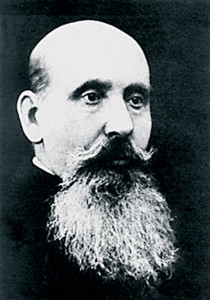
Fr. Heinrich Pesch
The longest economics textbook ever written is a five-volume work in German by a Jesuit priest named Heinrich Pesch. It contains 3,969 pages as it appeared in its final edition. Published in several editions between 1905 and 1926 by the distinguished Herder publishing house in Freiburg, Germany, it is entitled Lehrbuch der Nationalökonomie, which translates literally as A Teaching Guide to Economics. Its author was born on September 17, 1854, virtually in the shadow of the great Gothic cathedral in Cologne, Germany. Pesch died in a residence for aging and infirm Jesuits located in Valkenburg, Holland, on April 1, 1926. His grave is unmarked. In 1945, when the Nazi SS troops evacuated the Jesuit property which they had seized and occupied early in World War II, they bulldozed all of the graves at the site.
One reason why the Lehrbuch is largely unknown in the English-speaking world is the fact that it was not translated into the English language until recently. The translation, entitled Lehrbuch der Nationalökonomie/Teaching Guide to Economics, was done by the writer of this article after he retired from teaching in 1985. It was published in a 10-book format between 2002 and 2003 by the Edwin Mellen Press of Lewiston, New York (USA).
The question which deserves to be addressed at the outset is why anyone would want to devote the countless hours and inestimable energy required to translate into English an obscure, lengthy German work for which the last publication date was 1926. First of all, I was made aware early in my university years that essential elements of Pesch’s solidaristic economic system became a part of the Catholic Church’s social teachings. They included the principle of occupational organization, the principle of subsidiarity, and the twin social virtues of social justice and social charity. This was accomplished largely through two Jesuit understudies of Heinrich Pesch, Oswald von Nell-Breuning (1890-1991) and Gustav Gundlach (1892-1963). They were the principal aides to Pope Pius XI in the drafting of his landmark 1931 social encyclical Quadragesimo Anno (Reconstructing the Social Order). Many years later Blessed John Paul II devoted a significant portion of his encyclical Sollicitudo Rei Socialis (1987) to explaining the meaning and importance of solidarity in Catholic social teachings, declaring it to be “undoubtedly a Christian virtue” (40). Then, in Centesimus Annus (1991), the third of his great trilogy of social encyclicals, he identified what he now referred to as the principle of solidarity with the virtue of social charity (C.A. 10) that Pius XI had presented, along with social justice, as the “lofty and noble principles” required to restore social order (Q.A. 88).
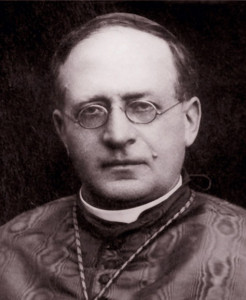
Pope Pius XI
Beyond that important connection, the Lehrbuch is an exceptionally expansive work containing substantial portions of the economic knowledge accumulated since the science began to take on some semblance of systematic structure from the 18th century onward. The late Professor Franz H. Mueller of St. Thomas University in St. Paul, Minnesota (1900-1994), who as a young student came to know Pesch personally in Berlin, referred to it as a “Summa Oeconomia.”
At least equally important, the Lehrbuch happens to be one of very few works in economics that proposes a form of economic system. Its author referred to that as the solidaristic system of human work, or solidarism. This places Heinrich Pesch in a select league with Adam Smith (Wealth of Nations, 1776), and Karl Marx (Communist Manifesto, 1848, and Das Kapital, 1867). With regard to Marx, it is worth noting that Pesch was in the somewhat unique position where he could evaluate Marxist theory before it emerged as a historical reality, as well as after its actual installation under Lenin. The first volume of the Lehrbuch, containing a critique of Marxian socialism, was published in 1905. In the subsequent 1924 edition of that first volume, Pesch was already able to judge key elements of the socialist system as it had been established in Russia by the Bolshevik Revolution in 1917.
Also noteworthy are certain parallels in the paths traveled by Heinrich Pesch, a Jesuit priest who was the son of a German tailor, and Karl Marx, an atheist who stemmed from a Jewish rabbinical family in Trier, Germany. Both began their academic studies at the University of Bonn where each at first pursued legal studies. Subsequently, Marx studied philosophy and history at the University of Berlin, then at Jena where he earned his doctorate. Pesch too, after his ordination as a priest and some already significant scholarly activity, began three years of economics studies at the University of Berlin at the age of 47. Prior to that, during the years of Bismarck’s Kulturkampf, there were laws banning Jesuits from Germany. Therefore, from 1885 until 1890, Pesch went into exile for his theological studies near Liverpool, the industrial heart of England. Marx, after being exiled from continental Europe for his revolutionary activities successively from Germany, from Belgium, and from Paris, also took refuge in England where he then published the first volume of Das Kapital. Thus, both the revolutionary and the Jesuit had the opportunity to observe first-hand the wretched conditions of the English working class where industrial capitalism was in an advanced stage.
The experience prompted Pesch to request from his superiors that he be assigned the mission of working toward improving the lot of the working class. The appearance in 1891 of Leo XIII’s labor encyclical, Rerum Novarum, contributed to that decision.
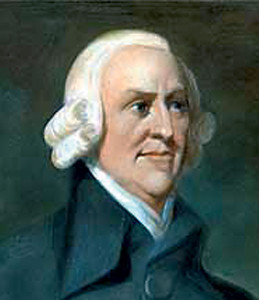
Adam Smith
The third economic system-builder, Adam Smith (1723-1790) of Scotland, is widely regarded as having provided the social philosophy for liberal or free market capitalism, with its reliance for guidance on each individual’s self-interest, or what he termed “an invisible hand.” Smith dealt a lethal blow to any sense of personal responsibility toward the common good by his cynical statement: “I have never known much good done by those who affected to trade for the public good.” He assumed that in this important matter the optimum common good would result automatically if each person were left to strive for his own individual good without regard for the general welfare.
Early in its social teachings, the Catholic Church placed great emphasis on the requirement that each individual contribute to the common good. In 1961, Pope John XXIII, now Blessed John XXIII, rendered a timely service to the social teachings of his Church by defining the common good as “…the sum total of social living whereby men are enabled more fully and more readily to achieve their own perfection” (Mater et Magistra 65).
In other words, the common good is far greater than the sum total of what individuals acting by and for themselves could possibly accomplish.
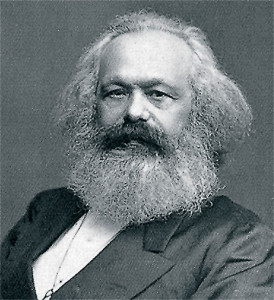
Karl Marx
Pesch had cited the importance of the practice of the virtues of social justice and social charity for the realization of the common good in economic life (II, 1, 295-308). Marx (1818-1883), on the other hand, had advocated a radical disbanding of the capitalist class which he perceived as ruthlessly exploiting the working class. That was based on his labor theory of value according to which all value on the market is the result of labor. Yet labor is paid only its subsistence, while all the surplus value is appropriated by the capitalists. Therefore a dictatorship of the proletariat will arise and righteously overthrow the capitalist order, and eventually a classless society will take its place.
Mainly on the basis of his influential work, General Theory of Employment, Interest and Money (1936), some would undoubtedly rank the British economist John Maynard Keynes (1883-1946) among the economic system-builders. No one should doubt his influence on economic policy as well as on the theoretical formulations of the science during the Great Depression and afterwards. Nevertheless, by his own admission, Keynes did not intend to usher in a new form of economic system. In his essay, The End of Laissez Faire (1926), he wrote: “For my part, I think that Capitalism, wisely managed, can probably be made more efficient for attaining economic ends than any alternative system yet in sight…”
Capitalism, understood as the overall societal predominance of those who own and control capital, actually emerged before the free market era during what is known as the mercantilistic era. That was characterized by significant government influence in economic life in order to acquire gold and silver by, among other things, assuring a positive balance of trade for one’s national economy. Keynes’ proposals could actually be perceived as a reversion to capitalism in its earlier, “wisely managed,” pre-free market form. In any case, it did not take long, after massive government deficit-spending during World War II put a definite end to the Great Depression, before the free market forces re-emerged triumphantly. Eventually their mischief worked its way, once again by means of the greed-inspired antics of bankers, to bring about the virtual collapse of capitalism in what is now being called the Great Recession.
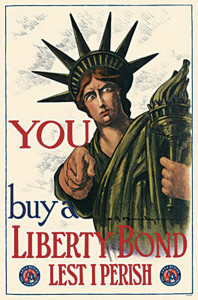
A poster encouraging citizens to trust and invest in their country’s economic system (much like similar efforts today).
The Jesuit Pesch opposed the capitalist system as well as the Marxian scheme. Like both Smith and Marx, he concurred that the wealth of nations stems in the first instance from the work of human beings – labor being the original active factor of production. That is why he referred to the system which he was proposing as the solidaristic system of human work. That, aside from his immense disheveled beard, is mainly what Pesch had in common with Karl Marx.
He did not agree with Marx that all value on the market is due to labor, or that private ownership of the material factors of production was to be abolished and taken over by the state. Instead of antagonism and conflict between the classes, he stressed the immanent solidarity among human beings as is evident from their inherent interdependence at all levels of society. That ranges from the family, to the workshop and the various occupational groupings to which people belong, up to the level of the nation, and beyond to the community of nations. Based on that principle of solidarity, individual self-interest needs to be subordinated to the common good and not left to result from the action of something like Adam Smith’s “invisible hand.” Nor is the state to be entrusted with the impossible task of being the administrator of all productive property.
With regard to that aspect of Pesch’s commentary on socialism, the Jesuit waxed prophetic. In the first edition of his Lehrbuch (1909) he wrote: “While we do not assert the impossibility of a socialistic order, one thing is certain: the communistic society cannot last long, not only because it presents the central administration with super-human demands, while sacrificing freedom in the process, but because it cannot possibly do justice to the distribution of goods in a manner that accords with the varieties of work performed, and as will satisfy the various workers”(II, p. 198). That was written eight years before the Bolshevik Revolution in Russia!
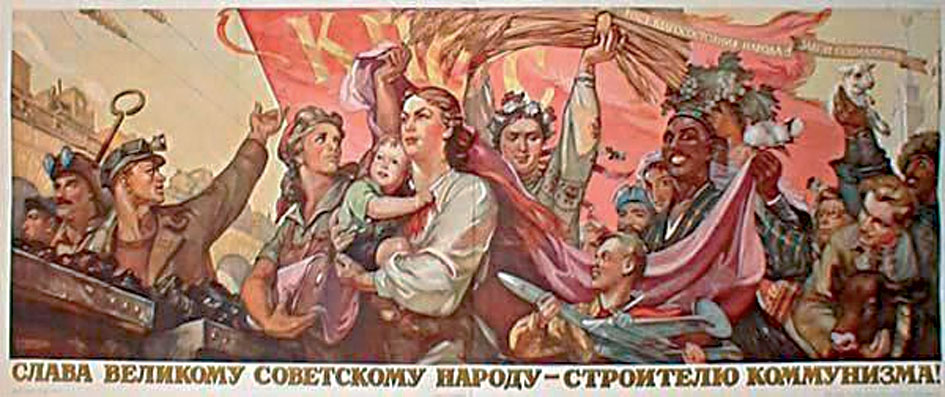
A Soviet Union poster from the 1930s in praise of the social benefits brought to Russia by socialism.
Marx never used the word capitalism. It was not yet a time for isms. He employed the terms capital, capitalists, and capitalistic. Pesch, on the other hand, not only used the term capitalism; he, in fact, gave a definition of it that was both concise and precise. In his fourth volume we find: “…in general: capitalism is the dominion over the national economy by the acquisitive interests of those who own capital” (IV, 2, 158). That avoids the frequent simplistic confusion of capitalism with mere private ownership of the means of production, the free market economy, etc.

One from 1957 which criticizes capitalism for leaving the poor without even basic necessities, like milk.
Nor was the Jesuit any more sympathetic to capitalism than Karl Marx! In an earlier volume of his Lehrbuch Pesch wrote: “The capitalistic system of free enterprise was able to propel production to a high level, but it was not capable of distributing the product throughout all of society in a manner which would bring about the material well-being of a nation. It not only robbed a man of his dignity, but all too often also of the price of his efforts. Unrestrained competition ended up in monopolization. Speculation shaped the market and determined the price structure. Excessive profits took the place of the fair return to labor. Even someone who rejects the Marxian concepts of value and surplus value will have to recognize how dangerous is the capitalistic and speculative appropriation of surplus value, which bears no relationship to any real services rendered to society. It is simply not possible for an entire nation to go on working indefinitely for the well-being of a handful of capitalist magnates and speculators” (II, 1, 252).
Pesch also pointed out that capitalism “controls the press, the sciences, the arts, the schools,” and that such control over the general culture “undermined individual as well as social morality, devastated family life, contaminated social intercourse, and divided people and nations into hostile armed camps…”
Now the Lehrbuch purports to be, first of all, not a tirade against capitalism, but a description of what an economic system is all about, and what it is supposed to accomplish. In the process of presenting an exposition of the principles, processes, and institutions that define economic life, the Jesuit economist also established the components, including the underlying social philosophy (solidarism), for the economic system which he termed the solidaristic system of human work. He juxtaposed that to the two economic systems: individualistic capitalism stemming to an important degree from the thinking of Adam Smith (followed by figures like David Ricardo and John Stuart Mill), and collectivistic socialism as envisioned by Karl Marx.
From its very first page, the Lehrbuch establishes that it is unlike any other economics textbook ever written.
Pesch opens with the heading: “Man as the Lord of the World According to God’s Ordinance.” That made him the first and only architect of an economic system where God matters. Since his position derived in the first instance from the Bible, and since he was a Jesuit priest, he was before long accused by some of his peers of “theologizing” economics. In the Foreword of subsequent editions of the second volume, Pesch remonstrated against the charge by noting that “economics has always been under the sway of one or the other Weltanschauung.” At first and for a long time “…it was the materialistic-Enlightenment point of view which had a decisive influence on bourgeois and socialistic economics.” He added, “And those too, in our own time, who do not want to hear about a normative science are for the most part under the influence of a positivistic, naturalistic, world-view.” In what some in our time would reject as an unecumenical posture, the Jesuit was quite blunt in expressing what was his own Catholic Christian world-view. For example: “I openly and unreservedly acknowledge my conviction that the grave conditions which today afflict nations stem from the de-Christianization of economic life, and that a remedy is to be expected only if the Christian world-view will again become predominant in the lives of people, nations, and specifically, also in economic life. Only then, if solidarity in the Christian sense again applies, can we expect that the universal idea of a community of workers will become a salubrious, practical possibility which adequately meets both individual and social needs, and that the antagonisms among people which have prevailed until now will be replaced by cooperation for and with one another among individuals, classes, and nations” (II, 1, iii).
Pesch went on to establish “Man as the Lord of the World Within the Framework of Society,” again in accordance with Genesis. The precautionary admonition that “the world will always be God’s property” could be seen as an early warning about environmental responsibility: “Herein lies the reason why man is never and nowhere the absolute lord,” and also “…why his dominion over this earth never and nowhere exists without its corresponding obligation” (I, 2, p. 21). That appeared first in the Lehrbuch in 1905, long before environmental concern took on the importance that it occupies in contemporary society. It also runs counter to the notion that the right of private ownership of property generally, or of the means of production specifically, is absolute as it came to be regarded in the world of individualistic capitalism.
There is much that is original and refreshing throughout Pesch’s systematic presentation of how the national economy should operate. It reflects, among other things, the solid training in philosophy and theology which Jesuits received in that era. For example, Pesch departed from the standard textbook presentation of three primary factors of production, “land, labor and capital,” as if they were somehow on a par with each other. He referred to them as man (German, Mensch; Latin, homo), nature, and capital, in that order.
While he addressed the position of man and his dominion over nature at the very beginning of the first volume, the meaning of the non-original factor, capital, was dealt with much later, in the fourth volume (IV, 1, 353-360). There Pesch, using the language of Aristotelian-Thomistic metaphysics, refers to capital as a causa efficiens instrumentalis of production, as opposed to “all human intellectual and physical labor power and work” – the factor which is a causa efficiens principalis. He termed it a “devastating thing that the ‘independence’ of capital during the period of free enterprise capitalism, elevated capital so that it was on a par with the original factors of production.” He went on to state: “Inasmuch as the work of those who carry out instructions was gradually deprived of its status as work by the free-wheeling power of those who owned capital and who directly or indirectly took over the management of production, so that such work was degraded to being a quasi-instrumental cause in the production process and at the same time to a commodity that was for sale, we opened up the door to the source from which the misery and plight of their workers and ultimately their revolt would stem” (IV, 1, 359).

The economic crisis of our time brings into question for many their hopes for a secure economic future.
In this analysis of causes as applied to the factors of production, there is a remarkable concordance with what Blessed John Paul II wrote in the first of his trilogy of social encyclicals, Laborem Exercens. Referring to “a principle that has always been taught by the Church: the principle of the priority of labor over capital,” the Polish Pope stated that “labor is always the primary efficient cause, while capital, the whole collection of means of production, remains a mere instrument or instrumental cause” (52). That important distinction subsequently established the foundation for Pesch’s just wage principle, i.e., “…that what ethics determines as being the just wage is, at the same time, the economically correct wage” (Vol.V, 2, 78). It also corresponds with what John Paul II wrote about the just wage in Laborem Exercens: “… the justice of a socioeconomic system, and in each case its just functioning, deserve in the final analysis to be evaluated by the way in which man’s work is properly remunerated in the system” (89). The concordance between Pesch’s solidarist economics and the Pope John Paul trilogy of social encyclicals suggests that frequent reference to him as the Pope of Solidarity is based not merely, or even mainly, on the brief historical interlude involving his support for the Polish labor union, Solidarity.
Pesch’s analysis of causes also led to his juxtaposition of the three principles around which contrasting economic systems were shaped: individualism with emphasis on Adam Smith’s liberalism; collectivism based on Karl Marx’s critique of capitalism; and solidarism based on the principle of solidarity as introduced by Pesch early in the first volume of his Lehrbuch. “When we speak of solidarity with regard to social life, we have in mind in a most general sense, first of all, social interdependence, the actual mutual dependence on one another” ( I,1, 36).
With the principle of solidarity as his foundation, Pesch went on to outline specifically his solidaristic economic system in Volume II, Book I, of the Lehrbuch. It is there that we find the various concepts and principles which would surface soon afterwards in papal social encyclicals starting with Quadragesimo Anno in 1931. These included specifically the virtues, social justice and social charity, which were established there by Pope Pius XI as the “lofty and noble principles” necessary for restoring social order (88). Perhaps because of the loose manner in which the term social justice came to be used, the virtue of social justice was defined by that Pope in his 1937 encyclical Divini Redemptoris (On Atheistic Communism): “It is of the very essence of social justice to demand from each individual all that is necessary for the common good” (51).
It was not until 60 years later in Centesimus Annus that Pope John Paul II identified social charity as “what we nowadays call the principle of solidarity…”(10). And that principle of solidarity, as cited above, was first clearly presented near the beginning of the first edition of the first volume of the Lehrbuch.
The principle of occupational organization (Q.A. 82-87) is also Pesch’s organizational principle for his solidaristic system. According to it, people are not to organize simply on opposing sides of the labor market like warring parties. Instead, all who work in a particular craft, industry or occupation should eventually organize according to craft, industry or occupation for the common good of that group, always in accordance with the good of society overall. There has been some shifting in terminology, and variations in expressing the Latin term ordines. One translation has tried to capture the essence with the term “functional groups” and also “vocational groups.” In Mater et Magistra, Blessed John XXIII used the term “intermediary bodies” (65). After his successor, Pope Paul VI, used the term “intermediate groups” (33) in Populorum Progressio, that appears to have become the established term for the present. Pius XI represented the concept as natural. “For as nature induces those who dwell in close proximity to unite into municipalities, so those who practice the same trade or profession, economic or otherwise, constitute as it were fellowships or bodies” (Q.A. 83).
The origin of that notion as expressed here is Peschian. Pesch introduced the notion of occupational solidarity in the first volume of his Lehrbuch. There he alluded to “Solidarity Among Colleagues at the Occupational Level and in Vocational Groups” (I, 2, 222). It appeared there as the fourth variety of solidarity in the overall pattern starting with “the universal solidarity of the entire human race.” It is integral to his solidaristic system, among other reasons, because he considered it essential for the proper functioning of yet another principle that was integral to his solidaristic system: the principle of subsidiarity.
The principle of subsidiarity, which established the position of the state in the economy, first appeared with that specific name in Quadragesimo Anno (80). However, the nature and purpose of the state was already presented clearly and concisely by Pesch in the Lehrbuch (I, 1, 207 ff.). There we find: “According to the simple and clear teaching of Christian philosophy, the state must provide the kinds of advantages that they have attained, but which they cannot achieve by their own powers, by the capacities of their families or other social bodies of narrower scope.” (The actual German word, subsidiär, in the relevant sense is used by Pesch in that part of the discussion, p. 218.)
Thus it is clear that the state is neither to control all aspects of the economy as under socialism, nor to absent itself from social control as in liberal capitalism. That important aspect of the Peschian proposal for a solidaristic system of economy appeared in the first edition of the first volume of the Lehrbuch in 1905.
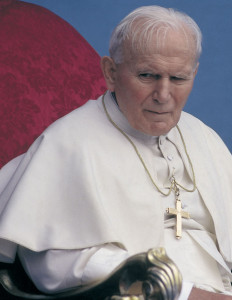
Blessed John Paul II, Pope from 1978-2005.
Finally, the all-important just wage principle in its basic form was already established by Pope Leo XIII in Rerum Novarum in 1891. Pesch therefore could already build on it and incorporate it as an essential feature of his solidaristic system of human work, as could his understudies who were involved in developing the Pius XI encyclical Quadragesimo Anno. Although the doctrine was cited and reaffirmed by all pontiffs who followed and presented social encyclicals up to the most recent one by Pope Benedict XVI (Caritas in Veritate 63), it was in Quadragesimo Anno (63-76) that the just wage doctrine received its fullest development in the Catholic Church’s social teachings.
Blessed John Paul II subsequently put the highest emphasis on the just wage in the first of his great trilogy of social encyclicals—his own labor encyclical, Laborem Exercens: “…a just wage is the concrete means of verifying the justice of the whole socioeconomic system…” (LE, 89). Commemorating, as it did, the 90th anniversary of Rerum Novarum, it turned out to be his own “labor encyclical” and it is in remarkable concordance with Pesch’s solidarist economics. One has only to read those words in Laborem Exercens alongside what Pesch wrote in his Lehrbuch about wages in 1923: “…an unbiased approach to this problem will show that what ethics determines as being the just wage is, at the same time, the economically correct wage” (V, 2, 78).
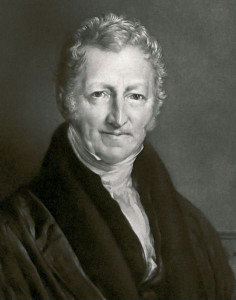
British philosopher Thomas R. Malthus (1766-1834).
In conclusion, no one who is familiar with the development of the economic science should resent the intrusion of a Catholic priest into the august circle of the “dismal science.” Long before the Jesuit Pesch joined their ranks with the longest economics text ever written, there was the dour Anglican curate, Thomas Robert Malthus (1766-1834). His brief essay with its lengthy title, the Essay on the Principle of Population as It Affects the Further Improvement of Society, appeared in 1798. The theme that there is a persistent tendency for population growth to outstrip food supply established a widespread fear which persists until now. It appears to resurface whenever there is starvation for whatever reason anywhere in the world. Marx dismissed Malthus’ notion cynically as providing a convenient excuse for what is really the exploitation of workers by capital as is endemic to capitalism. Pesch replied to the pessimistic schema with a proposition that seems perhaps more appropriate for a clergyman: “Thus we may say: where care has been taken to safeguard the quality of a nation’s people, generally there will be no need for concern about their quantity” (II, 2, 193)! His treatment of the matter in 1909 suggests that Pesch was closer to the pulse of the matter than Malthus with his alleged clash between the “geometric growth” of population vs. the “arithmetic growth” rate of the food supply. That holds also for the Jesuit’s proposal that greater population density itself provides greater incentive for people to improve their productivity than would be the case where population is sparse. That proposition, incidentally, has been supported by recent population/food supply experts like the British economist Colin Clark (1905-1989) who had access to far more hard statistical data than were available in Malthus’ time. Unfortunately, the bleak Malthusian scenario provided the pretext for the Victorian historian, Thomas Carlyle, to designate economics, perhaps forever, as the “dismal science.
Dr. Rupert J. Ederer is a retired professor of the State University College at Buffalo, New York, USA.




Facebook Comments